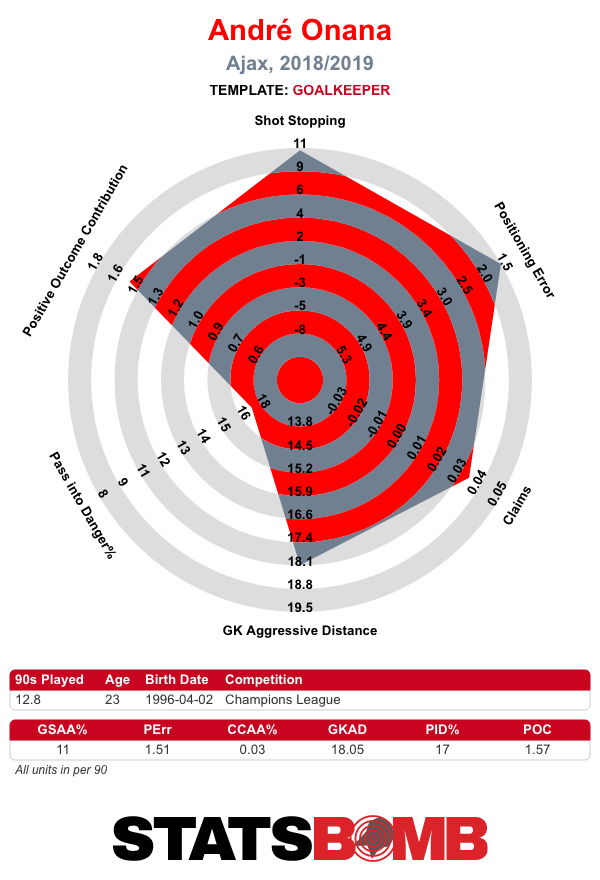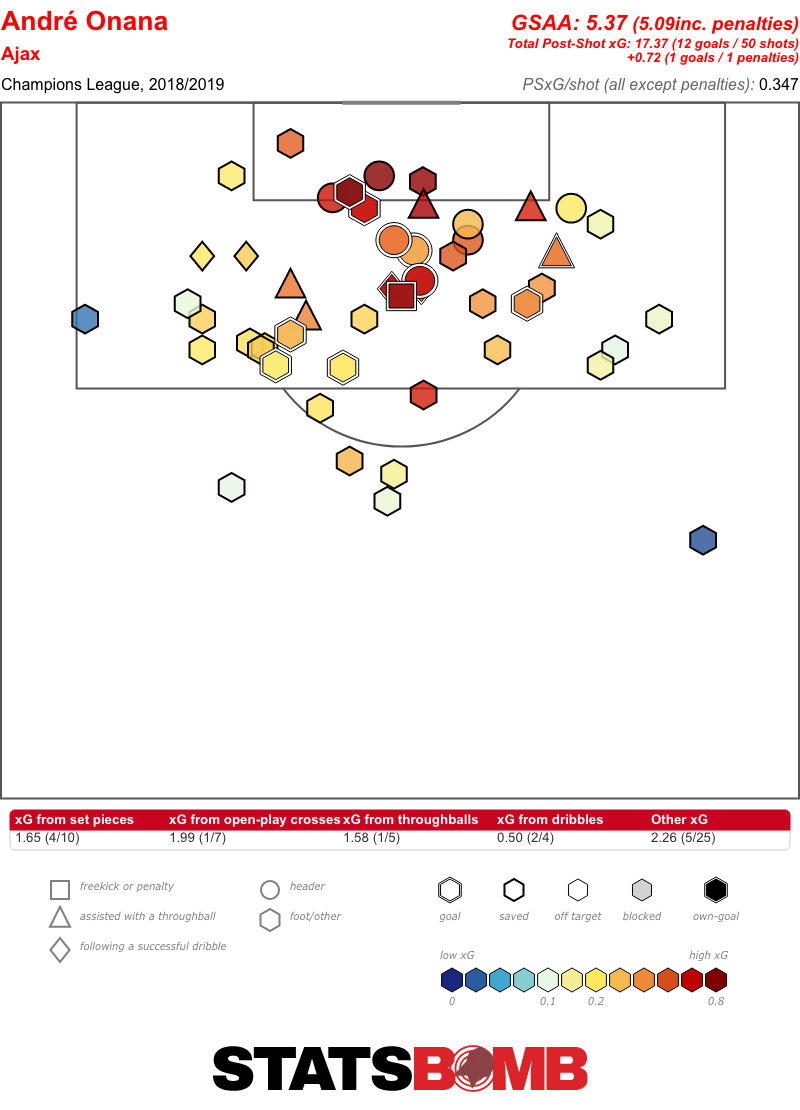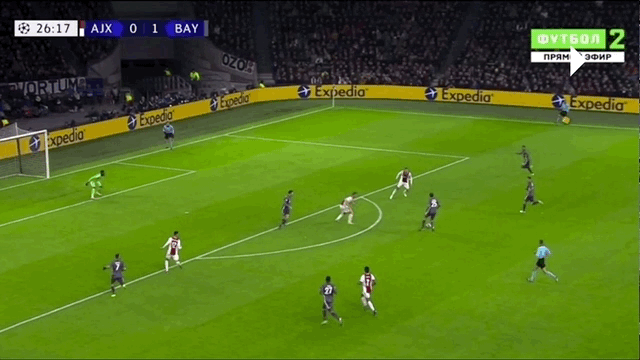André Onana enjoyed an excellent season between the sticks for Ajax. He was ever present in a side who claimed the league and cup double in the Netherlands and came so close to reaching the Champions League final, eliminating both Real Madrid and Juventus before losing out to Tottenham Hotspur in injury time of the second leg of their semi-final.
By StatsBomb numbers, he was a solid performer in the domestic league, preventing 3.51 more goals than the average goalkeeper would have been expected to, and ranking in the top six in the league in terms of both shot stopping (goals saved above average as a percentage of shots faced) and positioning. But it was in the Champions League where he really shined.

There, Onana ranked in the top six in various categories amongst all goalkeepers who started at least six matches, and was the best of all of those who reached the knockout stages in terms of shot stopping. Over the course of Ajax’s run to the final four, he prevented 5.37 more goals than the average goalkeeper would have been expected to.

His pair of superb reaction saves to deny Bayern Munich’s Robert Lewandowski during the thrilling, back-and-forth group stage encounter between the sides in December were worth just shy of one expected goal all by themselves.

The 23-year-old now turns his attention to the Africa Cup of Nations in Egypt, which begins on 21st June. He will be the starting goalkeeper for a Cameroon side seeking to successfully defend the trophy they won in Gabon two years ago.
Onana describes himself as someone who is able to accept criticism and learn from his mistakes, which makes him the sort of player that analytically minded coaches love to work with. For Cameroon, that coach is Pablo López. Part of Clarence Seedorf’s staff during the former Dutch international’s brief spell as Deportivo La Coruña head coach in the 2017-18 season, he is now working alongside Seedorf and Patrick Kluivert with Cameroon. He is also a product manager for ADESTRapp, the video recording and analysis solution that he uses in his work.
“Onana is a very professional player, and with his talent, his curiosity and his desire to learn, he is improving day by day,” López tells StatsBomb. “He is very receptive to video analysis because he knows that it will help him during the matches and help him improve as a goalkeeper. He asks for videos of the opposition players responsible for penalties, direct and indirect free-kicks and corners, the players who usually provide the final pass, those who cross and finish, and the movements and shots of the forwards. Also, after the match, he wants to see all of his actions in order to correct and strengthen certain concepts and actions.”
Onana is one of the most invested players he has ever worked with -- although he also cites Newcastle’s Fabian Schär and Fulham’s André-Frank Zambo Anguissa as others who have shown a keen interest in using video analysis to improve their games. “He has very few weaknesses, but he tries to improve every detail, both offensive and defensive,” López says. “He is very receptive to improving and fine-tuning what is already good about his game.”
López provides some specific examples of the videos shown to Onana, all taken from Cameroon’s 0-1 friendly defeat to Brazil last year. The first couple relate to the build-up phase.
López: “In this video we can see, and we indicate within the video, other options that he could have chosen, so that he has in mind that sometimes alternatives to what he did or had thought about doing can appear. In this case, it was a direct pass to the full-back who can receive with space and time to put together the next move. But in the end, it is the player who has to decide in the moment, and it could be that he interpreted things differently. He has to make decisions in milliseconds and with the risk that comes with being the last man.”
López: “In this video, we show a great, high-quality action with which he was able to overcome three lines of opposition pressure with a measured pass to [Eric Maxim] Choupo-Moting that allowed the whole team to advance.”
As that second example shows, the content of the videos isn’t always critical in nature. It is also important to reinforce the things that players do well, as the following two videos of saves made by Onana demonstrate.
López: “In this situation, we can observe how he is well-positioned throughout and stays on his feet, which allows him to react and be able to divert the shot and avoid a goal.”
López: “In this situation, we can see how he closes down the space by coming out to the opponent without taking his eyes off the ball at any stage prior to the shot, which demonstrates bravery and determination. In doing so, he reduces the possibility of scoring and covers more of the goal.”
Onana was one of the best positioned goalkeepers in the Champions League last season -- only Hugo Lloris, Jan Oblak, Marc-André Ter Stegen and Wojciech Szczęsny ranked ahead of him among those who made the knockout stages. “His positioning, concentration and his power and bravery are amongst his best qualities,” López affirms.
Cameroon’s national team is a competitive environment for goalkeepers. Onana’s understudies are Fabrice Ondoa, the team’s starter as 20-year-old in 2017, and 35-year-old Carlos Kameni, who, in López’s words, “puts his substantial experience, knowledge and leadership skills at the use of the younger goalkeepers and the entire squad.” They all work under the supervision of Alioum Boukar, himself a former national team goalkeeper.
During Africa Cup of Nations qualifying, most of the focus of the limited time the coaching staff had with the squad was on opposition analysis and outline tactical work. But with more time together in the build up to the tournament itself, their work will become more granular and iterative. Real-time feedback will be used to immediately correct and improve.
“We are introducing the ADESTRapp training method to obtain instantaneous visual feedback during pauses in the training sessions,” López explains. “This allows us to work on things in real time and for each player to instantly analyse their own actions in order to become conscious at a physical and mental level of their initial position, the timing and manner of their reaction, the execution and the end result.”
He provides an example video from his time at Deportivo La Coruña.
The three goalkeepers cycle through a two-man routine. The one who isn’t involved steps to the side to watch footage of their actions. They are told to focus on their foot movements and hand positioning. “It is an innovative methodology that we will establish as a normal way of working in the preparation period prior to the Africa Cup of Nations,” López says.
Cameroon are the competition holders, but all of the major bookmakers list at least five teams ahead of them in their rankings of the favourites for this year’s tournament -- the first held in the summer and with an expanded field of 24 teams. “There are strong national teams like Egypt, Tunisia, Senegal, Morocco and Nigeria, the five African teams who played at the World Cup in Russia,” López says. “There are also Algeria, Ghana and Ivory Coast, all of whom have legitimate stars on their teams and are very well coached.”
All of which is to say that if Cameroon are to hold onto their trophy, they will need their goalkeeper to be at his best. If nothing else, Onana will be well-prepared.